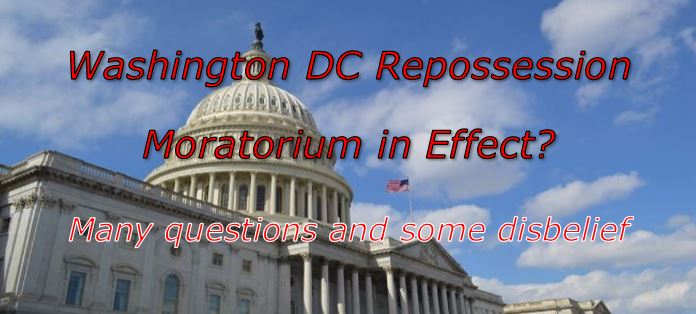
Many questions and some disbelief
On September 1, 2021, Washington DC Mayor Muriel Bowser signed into effect Washington D.C. Council Bill 240348 titled “Protecting Consumers from Unjust Debt Collection Practices Temporary Amendment Act of 2021.” Within it’s pages is a 225 day extension of consumer protections against certain debt collection activities and repossessions. This bill and it’s effective date seems to be a source of confusion for both lenders, attorneys and Repossessors alike. According to one agency owner, Santander Consumer USA, for one, is assigning repossessions in DC as usual.
The Bill
Stated in the bill are two focal areas of importance;
Page 9, “(aa)(1) Notwithstanding subsection (a) of this section, this subsection and subsection (bb) of this section shall apply to any debt, including loans directly secured on motor vehicles or direct motor vehicle installment loans covered by Chapter 36 of this title.
“(2) During a public health emergency and for 60 days after its conclusion, no creditor or debt collector shall, with respect to any debt:
“(A) Initiate, file, or threaten to file any new collection lawsuit;
“(B) Initiate, threaten to initiate, or act upon any statutory remedy for the garnishment, seizure, attachment, or withholding of wages, earnings, property, or funds for the payment of a debt to a creditor;
“(C) Initiate, threaten to initiate, or act upon any statutory remedy for the repossession of any vehicle; except, that creditors or debt collectors may accept collateral that is voluntarily surrendered;
And;
Page 11, (b) This act shall expire after 225 days of its having taken effect.
Washington D.C. has an unusual idea of temporary in that they have extended previous moratoriums twice and have basically been in a virtual Repossession and Collections Sanctuary City since the pandemic struck. At year-end 2020, According to data from the New York Federal Reserve Bank Consumer Credit Panel/Equifax, auto loan delinquency in the District was at 10.35% as of the last quarter of 2020, the higher than any point during the Great Recession.
This is odd because according to Experian’s year end 2020 11th annual State of Credit report, nationally, auto loan delinquency was actually lower by as much as 3% across all delinquency tranches days 30-180 when comparing 2019 to 2020. The highest tranche was Average 90 – 180 days past due was only 3.80%. If this data point is correct, DC is, or at least was, a bigger financial wreck than many may assume because during this period neither Maryland, nor DC showed in the bottom five of states with the lowest credit scores.
This peculiarity is nothing unusual for DC, which is a district of it’s own and is governed in part by the US Congress. As such, this bill has been sent up to Congress on September 14th for approval, which it is likely to receive. According to Legiscan, this bill is expected to go into law on November 1, 2021. According to the bill, This act shall apply as of July 24, 2021.
Questions
This brings to question three issues. One, is the bill effective now or will it be retroactive to the July 24th date? Considering that this is still pending congressional approval, how is this to be applied when it does get approved?
Two, in the Supreme Court’s August ruling against eviction moratoriums in The Alabama Association of Realtors vs The Department of Health and Human Services, they ruled against the moratorium stating “If a federally imposed eviction moratorium is to continue, Congress must specifically authorize it. The application to vacate stay presented to THE CHIEF JUSTICE and by him referred to the Court is granted.” As stated in the bill, it requires congressional approval. While Congress failed to adopt the moratoriums at the federal legislative level, does their approval of the Washington DC bill meet the Supreme Court’s requirements as it appears it does?
Question three, considering that lenders will be prohibited from repossessing in DC, what are they to do to mitigate these restrictions from a risk management standpoint? Should they quit lending to its citizens could they be guilty of redlining? This is a question a Virginia attorney had posed on this and was at a loss as to what to advise his clients in the area.
What next?
For repossession agencies, as mentioned, Santander Consumer USA has not stopped assigning in the area and at least one agency owner has advised that he is actively repossessing and has had, so far, no issues (fingers crossed.) Is Santander taking a measured risk or do they have legal opinion telling them that the law is not in effect yet?
These are good questions, but I think everyone in the repossession industry knows what happens when a lawsuit kicks in. The lender and forwarder settle their way out of it and the agency is left dangling in the wind to defend themselves. This could get messy without clear legal clarification. But then again, with its July 24 effective date, who is to say it’s not a retroactive legal trap and intended to cause lenders trouble?
Not being an attorney, I am in no way offering or suggesting legal advise on this issue and I strongly urge anyone doing business in the Washington D.C. area to do so through a licensed attorney.
Kevin










